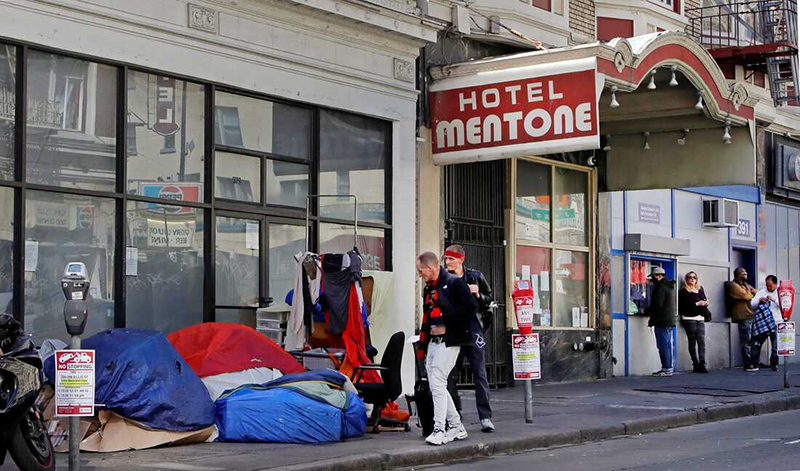San Francisco’s Multi-Million Dollar Dilemma: The Costly Fallout of Housing the Homeless during the Pandemic
San Francisco finds itself facing a potential $26 million payout, adding to the already substantial sum it paid to house homeless individuals in hotels during the pandemic.
Amidst a backdrop of declining hotel revenues, California’s Project Roomkey aimed to address the pressing issue of homelessness by providing shelter and financial support to hotels. While lauded by advocates, the program’s financial burden has now come to light.
In December 2020, California Governor Gavin Newsom praised the program’s significance in protecting vulnerable citizens and commended the state’s commitment to implementing this pioneering initiative. However, three years on, the program’s costs have skyrocketed, leaving the city grappling with a staggering financial predicament.

Historic Hotel Owners Take Legal Action: San Francisco Faces Multi-Million Dollar Lawsuit Over Project Roomkey
A legal battle looms over the city of San Francisco as hotel owners pursue a lawsuit against the municipality, claiming extensive damages caused by their involvement in Project Roomkey, the initiative to house the homeless during the pandemic.
One hotel, the Tilden Hotel, seeks compensation of $2.9 million, while Hotel Union Square demands $5.3 million for the harm suffered by their historic establishments while providing shelter to vulnerable individuals. The city has already agreed to pay these substantial sums, acknowledging the financial toll inflicted on the hotels during their participation in the program.
As the legal proceedings unfold, San Francisco faces the daunting prospect of additional financial liabilities, potentially further burdening its already strained budget.
San Francisco Faces Mounting Costs: City Set to Pay $26 Million in Damages for Project Roomkey
San Francisco’s financial woes continue to escalate as officials anticipate a hefty payout of $26 million for damages resulting from the Project Roomkey program. The program, aimed at housing the homeless during the pandemic, has already incurred significant expenses for the city.
A budget report released in February revealed the city’s plan to allocate millions of dollars to cover damage claims associated with the program. This comes in addition to the substantial funds already expended, as California paid out a staggering $512 million to local governments for Project Roomkey by December 2020. Astonishingly, this accounted for just 25% of the program’s total costs, which exceeded $2 billion according to the governor’s office.
The mounting financial burden highlights the significant challenges faced by San Francisco as it grapples with the repercussions of the ambitious initiative. As the city braces itself for further payouts, the strain on its budget raises concerns about the long-term sustainability of such programs and their impact on local taxpayers.
California’s Budget Surplus Turns into a $32 Billion Deficit as Roomkey Settlements Pile Up
In a surprising turn of events, California finds itself grappling with a staggering $32 billion budget deficit, starkly contrasting the significant surplus reported during the pandemic. The financial strain is further exacerbated by the impending $19.6 million settlement with the owners of Hotel Whitcomb, awaiting approval from the full Board of Supervisors and the mayor’s signature.
The costly settlements are shedding light on the flaws of the Roomkey program, prompting critics to question the efficacy of simply pouring funds into homelessness without a comprehensive and rational strategy. It serves as a sobering reminder that the crisis demands more than a monetary approach and necessitates innovative solutions and holistic interventions to address the root causes.
The unexpected budget shortfall forces California to confront the pressing need for prudent financial management and a reevaluation of the state’s approach to tackling homelessness. The consequences of the deficit are likely to reverberate throughout the state, underscoring the urgency of finding sustainable and effective solutions to combat the ongoing crisis.



